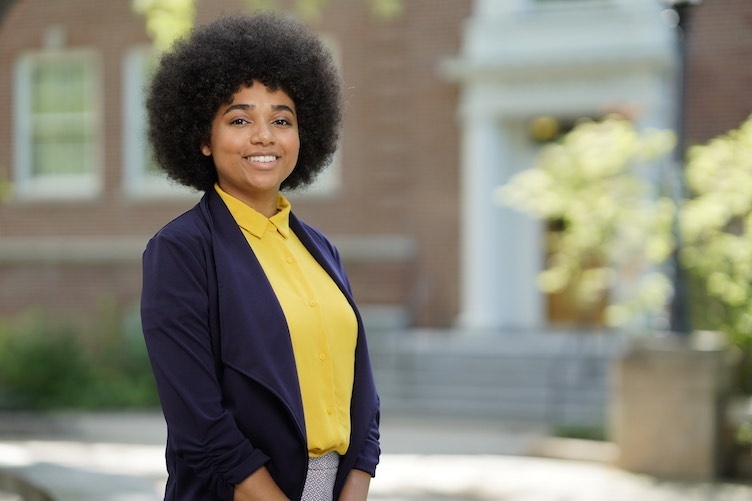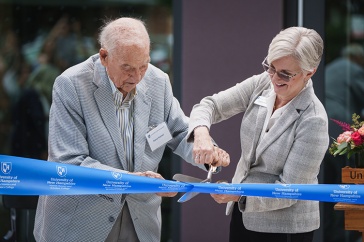
Julian Maduro '21, who is also a McNair Scholar and a recipient of the Alice Marguerite Mitchell scholarship, credits the McNair program and her other scholarship opportunities with making her UNH experience a rewarding one that has set her on a path she is excited to follow.
When Julian Maduro ’21 says she grew up around books, she is speaking both figuratively and literally. Raised in a family that promoted reading from a young age, she recalls selecting stories from expansive floor-to-ceiling bookshelves in her childhood home that were always stocked with titles.
For Maduro, books were always in abundance. What she came to find was much scarcer, though, were characters in those books that looked like her.
“I remember sitting there one day and realizing that with all the books we had, there was only one children’s book with a character of color. I was thinking, we’re a Black family with this huge book collection and we only had this one book? When I started looking at it, I realized it wasn’t just a problem in our library – it’s everywhere. There just aren’t a lot of options with multicultural characters for children.”
Years after that revelation, Maduro took the opportunity to explore the phenomenon – and the impact it has on reading habits into adulthood – in greater detail thanks to UNH’s McNair Scholarship program, which prepares undergraduate students for entrance into Ph.D. programs by providing academic and social support services through internships and summer research fellowships.
Maduro was selected as part of the 2019 cohort, and her project, “The Relationship Between Multicultural Representation in Children's Literature And Reading Practices Of Young Adults,” examines a potential correlation between that lack of representation and the fact that students of color have been found to read significantly less than their white peers in the United States.
Maduro partnered with mentor Laura Smith, a senior lecturer in the English department, and set out to discuss the topic with 12 UNH students – six white students and six students of color – asking them to recall their experiences as young readers.
“I discovered essentially what I expected, that students don’t want to read things that aren’t relatable or relevant to them,” Maduro, a dual major in English and justice studies, says.
Maduro was intrigued to discover that likely because characters of color are so rare, students could recall very specific details about the few stories they did encounter featuring characters they could relate to culturally, even if they hadn’t read those stories in more than a decade.
“One of the most interesting things I found was interviewing students of color who would remember a book from third grade and be able to recall everything a character did because she was ‘Latina like me’ or ‘from an African family like me,’” Maduro says. “They would remember every detail. But if I asked them about an academic text they’d read the year prior, the details wouldn’t stick with them.”
Getting involved in issues surrounding race and culture is nothing new to Maduro, who is active in many such student organizations at UNH. She has served as secretary and co-chair of NALA, the university’s support group for women of color, and is a member of both the Black Student Union and the UNH Queer and Trans People of Color group.
She has used her voice to address issues of race and gender throughout her time at UNH, acting as a panelist for SafeZones, which focuses on creating an inclusive environment for LGBTQIAP+ faculty, students, and staff. She also recently joined Tito Jackson '99, '18H to lead a webinar in the aftermath of the George Floyd murder, “Black Student Union Sit-Ins to #GeorgeFloyd: A Reflection on our Past, an Examination of our Present, and a Reckoning with our Future,” in which she reflected on the role race played in her own upbringing in largely white spaces, the need for better awareness around non-white cultures and races at UNH and ways she believes the university can improve its recruitment and retention of students of color.
She’s not finished exploring the topic that got her started with the McNair program, either – she has been accepted as part of the program for a second time this summer and intends to examine the level of diversity in reading lists at New Hampshire public high schools. Her initial research revealed that modern reading lists around the country feature fewer than 16% of titles written by female authors, and less than 7% by authors of color, and she plans to survey New Hampshire educators to explore whether they are looking to change that trend and how students are responding to the books they are reading.
Once she completes her senior year, Maduro says she will probably take a “gap year” before likely pursuing a Ph.D. program in criminology (the McNair program has helped connect Maduro to contacts at UCLA, one of her top choices for pursuing a graduate degree).
Her interest in the intersection of creative writing and cultural diversity could play just as significant a role in her future as it has in her past and present, too – she has one unpublished novel complete and is working on another that she hopes to publish first, with a projected completion date of spring 2021, and her writing fittingly features extensive “commentary on social issues,” she says, including the exploration of diversity and sexual identity.
Maduro, who is a Hamel Scholar, a McNair scholar, and a recipient of the Alice Marguerite Mitchell scholarship, credits the McNair program and her other scholarship opportunities with making her UNH experience a rewarding one that has set her on a path she is excited to follow.
“The scholarships I’ve received have made such a difference for me. I would have been able to go to UNH, but without them I wouldn’t have been able to have the experience I’ve had. The McNair Program connected me with so many amazing people and has given me so many opportunities,” Maduro says, noting that her initial contact with the ACLU came through the McNair program, which is part of the federally-funded TRIO program.
-
Written By:
Keith Testa | UNH Marketing | keith.testa@unh.edu
















































